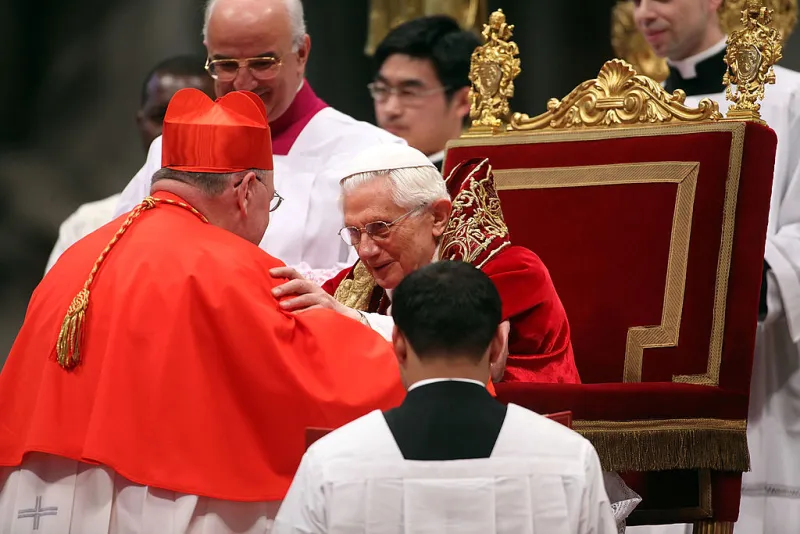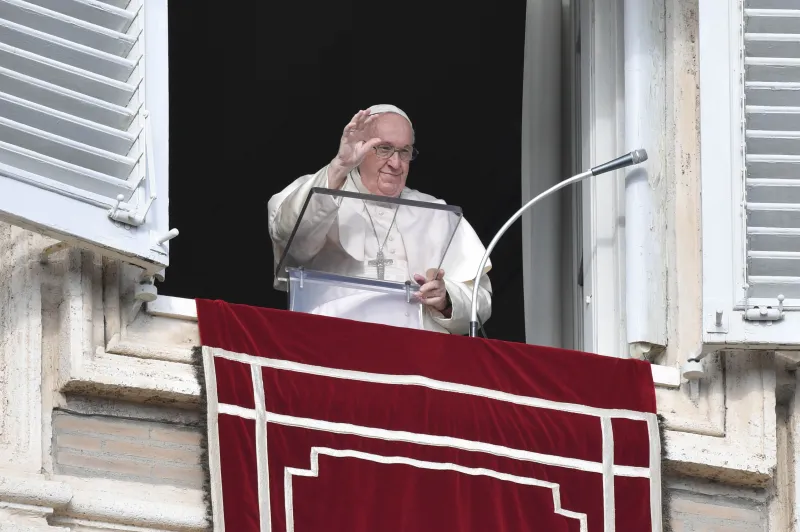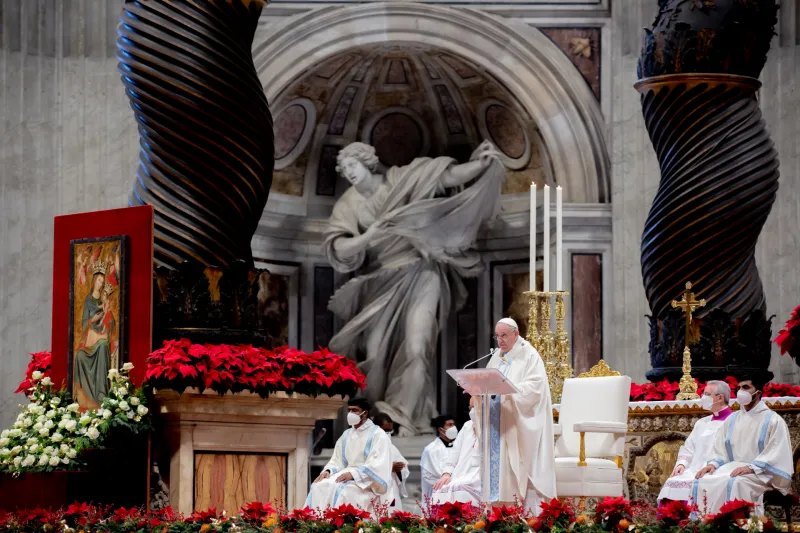 New cardinal Timothy Michael Dolan (L), Archbishop of New York, receives the biretta cap from Pope Benedict XVI in Saint Peter’s Basilica on February 18, 2012 in Vatican City, Vatican. / Franco Origlia/Getty Images
New cardinal Timothy Michael Dolan (L), Archbishop of New York, receives the biretta cap from Pope Benedict XVI in Saint Peter’s Basilica on February 18, 2012 in Vatican City, Vatican. / Franco Origlia/Getty Images
Washington, D.C. Newsroom, Jan 1, 2023 / 11:33 am (CNA).
Since the death of Pope Emeritus Benedict XVI, members of the College of Cardinals from the United States have offered tributes to the late pope who they remember as a “scholar” and “true disciple.”
Here is a round-up of statements from the U.S. cardinals:
Cardinal Timothy Dolan, Archdiocese of New York
Cardinal Timothy Dolan called Benedict XVI “a good shepherd and Holy Father.” In an interview with Newsmax Dolan shared that he met Benedict XVI “innumerable times” and was “always impressed with his ability to listen,” adding that “he knew the biblical, that before you can be a teacher you’ve got to be a listener.”
Dolan compared Benedict’s passing to losing a grandparent or elderly parent, saying “we knew it was coming,” but that “it’s still a shock when it comes.”
In a statement, Dolan said, “The human family grieves the passing of this erudite, wise, and holy man, who spoke the truth with love.”
Dolan called to mind Benedict XVI’s pastoral visit to the Archdiocese of New York in 2008 and shared his personal sense of loss at the former pope’s death, saying, “he was so encouraging, and appointed me Archbishop of New York and nominated me a Cardinal.”
Dolan said Benedict’s legacy will be that of “faith and reason” and called for every parish in his archdiocese to offer a Mass for Benedict’s soul, concluding, “may the angels lead him into paradise!”
Read Dolan’s full statement here.
Cardinal Blase Cupich, Archdiocese of Chicago
Cardinal Blase Cupich stated that “Pope Benedict XVI taught us that belief in God means completely placing our trust in Divine Providence.”
“Throughout his life as a scholar and as a churchman, he showed us what it means to fulfill the ancient command to love God with all your heart, with all your soul and with all your mind,” said Cupich.
“I think he will be remembered as a man who was single-focused on serving others and serving God,” Cupich told ABC 7.
Read Cupich’s full statement here.
Cardinal Daniel DiNardo, Archdiocese of Galveston-Houston
Cardinal Daniel DiNardo said that “it is with deep sadness and hope in the Resurrection that we mourn the death of Pope Emeritus Benedict XVI.”
DiNardo called Benedict a “true pastor of souls and son of the Church,” saying the former pope “shepherded the Church with great love.”
“His keen intellect invigorated the New Evangelization,” said DiNardo, and inspired “countless men and women to spread the Gospel by the example of their lives.”
“May the Lord now welcome this faithful servant into the heavenly liturgy of the Wedding Feast of the Lamb,” DiNardo said.
Read DiNardo’s full statement here.
Cardinal Sean O’Malley, Archdiocese of Boston
“Today, a loving God called Pope Emeritus Benedict XVI home to his eternal reward for a lifetime of dedicated service to the Church,” said Cardinal Sean O’Malley.
“Perhaps the most moving experience for me was accompanying survivors of clergy sexual abuse to a meeting with the Holy Father in Washington, D.C. during his 2008 pastoral visit to the United States,” O’Malley said. “Pope Benedict XVI recognized the pain experienced by survivors and all persons impacted by the abuse crisis.”
“I will miss Pope Benedict,” said O’Malley. “His fidelity to maintaining the truth and clarity of the Catholic faith, cultivating ecumenical and interfaith dialogue and reaching out to inspire the next generation of Catholics have been great gifts to us all.”
Read O’Malley’s full statement here.
Cardinal Joseph Tobin, Archdiocese of Newark
Cardinal Joseph Tobin shared his prayer for the former pope, saying, “May the Angels lead you into paradise; may the martyrs greet you at your arrival and lead you into the holy city, Jerusalem. May the choir of Angels greet you and like Lazarus, who once was poor, may you have eternal rest” (In Paradism). May he rest in the peace of Christ.”
Cardinal Robert McElroy, Diocese of San Diego
“The death of Pope Benedict is a moment of both sadness and gratitude,” said Cardinal Robert McElroy, who was appointed a cardinal just this May.
McElroy called Benedict a “theologian of immense depth” as well as a “caring pastor” and a “prayerful servant who unswervingly sought to follow the pathway to which God was calling him.”
“In faith we know that he goes to the loving embrace of the God whom he had served with sacrifice and courage, brilliance and wisdom, humility and kindness for his entire life,” said McElroy.
Read the full statement here.
Cardinal Raymond Burke
“It was my honor to serve him as Prefect of the Supreme Tribunal of the Apostolic Signatura,” said Cardinal Raymond Burke, prefect emeritus of the Apostolic Signatura and archbishop emeritus of the Archdiocese of St. Louis. “In my meetings with him, while he was still Roman Pontiff and after his abdication, I was always impressed by his extraordinary intelligence and knowledge, coupled with Christ-like meekness.”
Burke said that Benedict’s teaching regarding the sacred liturgy will remain “a lasting and living heritage.”
“He was an especially gifted teacher of the Catholic Faith with a particular appreciation of the highest and most perfect expression of the Faith: Sacred Worship,” said Burke.
Burke called the former pope’s passing “sad,” saying that Benedict had “continued to be a source of many graces for the Church, especially by the offering of his prayers and sufferings for so many needs of the Church in our time.”
Read Burke’s full statement here.
Cardinal Justin Rigali
“I had the privilege of knowing Pope Benedict for many years, going back to his time as a cardinal of the Church — Cardinal Ratzinger,” said Cardinal Justin Rigali, archbishop emeritus of Philadelphia.
Rigali recalled his participation in the election of Benedict XVI, saying, “it was a privilege to participate in the election of Pope Benedict. I can remember when I went up to the pope and knelt before him to show my respect and offer to him my pledge to be faithful and obedient, the first thing that Pope Benedict said to me was, ‘Happy Birthday, your eminence.’ It was my 70th birthday. Pope Benedict remembered that, and that is a memory I will always carry with me.”
Read more of Rigali’s statements here.
Cardinal James Stafford
Cardinal James Stafford, who participated in the former pope’s election, called Benedict XVI “a true disciple,” Denver Catholic reported.
“Pope Benedict XVI was dedicated to the mystery of Jesus of Nazareth,” said Stafford, archbishop emeritus of the Archdiocese of Denver.
Stafford shared, “In afternoon walks in the Vatican Gardens I sometimes encountered Pope Benedict. I thought that here was a true disciple ‘who walks with Jesus and is thus caught up with Him into communion with God.’” Concluding, “May he rest in peace!”
Read more of Stafford’s statement here.
[…]







